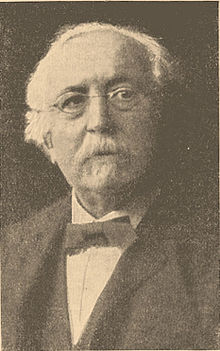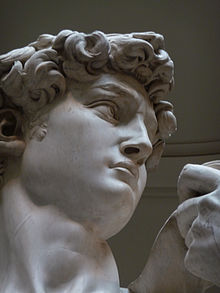Hermann Cohen
German philosopher (1842–1918)
Hermann Cohen (4 July 1842 – 4 April 1918) was a German Jewish philosopher, one of the founders of the Marburg School of Neo-Kantianism.


Quotes
editThe Concept of Religion in the System of Philosophy (1915)
edit- Der Begriff der Religion im System der Philosophie
- Volume 10, Part 1 of Philosophical Works
- Wenn ich Gott liebe, so liebe ich nicht pantheistisch das Universum, nicht die Tiere, die Bäume und die Kräuter, als meine Mitgeschöpfe, sondern aber ich liebe in Gott einseitig den Vater der Menschen, und diese höhere Bedeutung und diese soziale Prägnanz hat nunmehr der religiöse Terminus von Gott alsVater: er ist nicht sowohl der Schöpfer und Urheber, sondern vielmehr der Schutz und Beistand der Armen.
- If I love God, I don't in this way pantheistically love the universe, or the animals, trees and shrubs as my fellow created beings, but rather I love in God precisely the Father of Humanity. And this higher meaning, this social significance, always has its terminus in God the Father. He is not so much the creator and author, but much more the protector and comforter of the poor.
- p. 81
- If I love God, I don't in this way pantheistically love the universe, or the animals, trees and shrubs as my fellow created beings, but rather I love in God precisely the Father of Humanity. And this higher meaning, this social significance, always has its terminus in God the Father. He is not so much the creator and author, but much more the protector and comforter of the poor.
- Unter dieser Beleuchtung entsteht mir der Gott, der der Beistand des Armen ist und sein Rächer in der Weltgeschichte. Diesen Rächer der Armen liebe ich.
- In this light the God who appears to me is the comforter of the poor and their avenger in world history. This avenger of the poor is the God I love.
- p. 81
- In this light the God who appears to me is the comforter of the poor and their avenger in world history. This avenger of the poor is the God I love.
- An dem Armen geht mir der Mensch auf. Daher kann ich den Menschen nicht denken ohne das Mitleid mit ihm, ohne die Liebe zu ihm. Nicht das Universum, aber das sittliche Universum, das soziale Dasein der Menschen muß ich denken und lieben, wenn mein Denken Gottes: Liebe heißen darf.
- In the poor man I see humanity. I can't think of humanity without feeling sympathy for him, without feeling love for him. It is not the physical universe, but rather the moral universe, the social existence of mankind, that I must think and love, if my thought of God is to be called love.
- p. 81
- In the poor man I see humanity. I can't think of humanity without feeling sympathy for him, without feeling love for him. It is not the physical universe, but rather the moral universe, the social existence of mankind, that I must think and love, if my thought of God is to be called love.
- Wurm, der ich bin, von Leidenschaften zerfressen, der Selbstsucht zum Köder hingeworfen, soll ich dennoch den Menschen lieben. Wenn ich dies kann, und sofern ich dies kann, kann ich auch Gott lieben.
- Worm that I am, consumed by passion, cast as bait for selfishness, I must nonetheless love humanity. If I can do this, and insofar as I can do this, I can also love God.
- p. 82
- Worm that I am, consumed by passion, cast as bait for selfishness, I must nonetheless love humanity. If I can do this, and insofar as I can do this, I can also love God.
Reason and Hope: Selections from the Jewish Writings of Hermann Cohen (1971)
edit- Only the idea of God gives me the confidence that morality will become reality on earth. And because I cannot live without this confidence, I cannot live without God.
- p. 5
- Love of God implies love of religion. And religion exemplifies that creative spirit of God which is at work in history as well as in the mind of man. Thus, one ought to love any religion, that is, religion as such, and in any form—as a manifestation of the moral spirit, the divine spirit of mankind.
- p. 52
- Wherever rights are denied the poor, the prophetic anger is turned not merely against the incumbent rulers but equally against the means society employs to gloss over its own mendacity. And foremost among these means is art. Catering to luxury and emphasizing only the beautiful, art denies the fact that wretchedness and destitution have a tight grip on the poor. This is the reason why the prophetic zeal turned against art, and not merely against the luxury of women and the pretentiousness of the rich.
- p. 118
- Ethics must not remain a lovely abstraction; it must be concretized into valid truth. At this point ethics joins forces with religion because ethics too has ultimately no other recourse but to hypothesize the idea of God: not for the personal redemption of the moral individual but as a guarantee for the eventual realization of morality in this world.
- p. 122
- Man's hope is transformed into faith when he no longer thinks of himself alone, that is, of his salvation here and now, or of his eternal salvation (the latter, if I may say so, with calculating sanctimoniousness). Hope is transformed into faith when man associates the future with the emergence of a community whose concerns will reach beyond its everyday concrete reality. Such a community will not be composed merely of man's immediate circle of friends or family nor will it include only those who share his own cherished beliefs; indeed, it will even cut across the borders of his own country because it will represent the community of mankind.
- p. 124
- As faith in mankind, Israel's faith is hope. And it is this epitome of Israel's prophetism, this hope in mankind's future, that comprises the substance of the messianic idea.
- p. 124